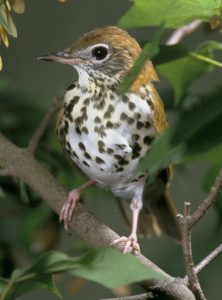Written by Nancy Nabak, Communication & Development Coordinator
New Year’s resolutions always seem to be the same: eat less, work out more, and get in touch with friends that you haven’t talked to in years. This year I’m considering something different and hope you’ll do the same. I’m imagining my back yard as reaching all the way to South America. My second resolution is not to give up coffee, but to purchase more family owned, shade-grown java. The two resolutions go together.
I figure that if I can see my backyard as including Central and South America, then I have beautiful neo-tropical songbirds to call my “own” year ‘round. Why does this changing view matter? Because we as humans, tend to care for what’s literally within our reach.
Recently, I attended a presentation on family owned, shade-grown coffee. Like the coffee I start my day with, it was eye opening. I didn’t realize this, but coffee is the second largest trade commodity in the world. Something with this big of an economic impact can have a significant influence on an ecosystem’s sustainability, and the needs of our songbirds.

Wood thrush, photo credit: Wikipedia
Songbirds have experienced major decline since the 1960s, including the Wood thrush, with a 60% species loss. Have you ever heard the beautiful “ee-oh-lay…” of the Wood thrush? It lifts your heart and carries your soul to the spirit of the woods. This thrush forages in leaf litter, so it does well in shade-grown coffee farms. Where there is no leaf litter… you get it. In general, coffee farms that have more canopy and surrounding forests, even fragmented, sustain more migratory and resident bird species.
How your backyard resolution makes a difference: You can feed birds (and protect habitat) in Central and South America by buying bird-friendly coffee. Your small purchase supports their food sources. This is just as relevant as you putting seeds in your feeders here.
“Bird Friendly” coffee can come in many varieties. There are certification guides that can be found on line to get an idea of what “shade grown” means and what brands you may choose to support. If you are familiar with LEED certification for architecture, it’s similar with coffee certification. The top certification, “Bird-Friendly (Smithsonian Migratory Bird Center)” is the only true shade-grown certification. However, there are many small shade coffee farms that are not certified at this level (expense), but are very bird friendly. Ask your Roaster about their coffee supplier and how their coffee is grown. Read labels in the grocery store. Great news: because of our purchase choices, the demand for smaller, shade focused coffee farms is on the rise.
In this new year, I ask you to join me. Let’s extend our backyards and do a little more for our birds. I know I can make a difference through a simple cup of coffee, and so can you.
